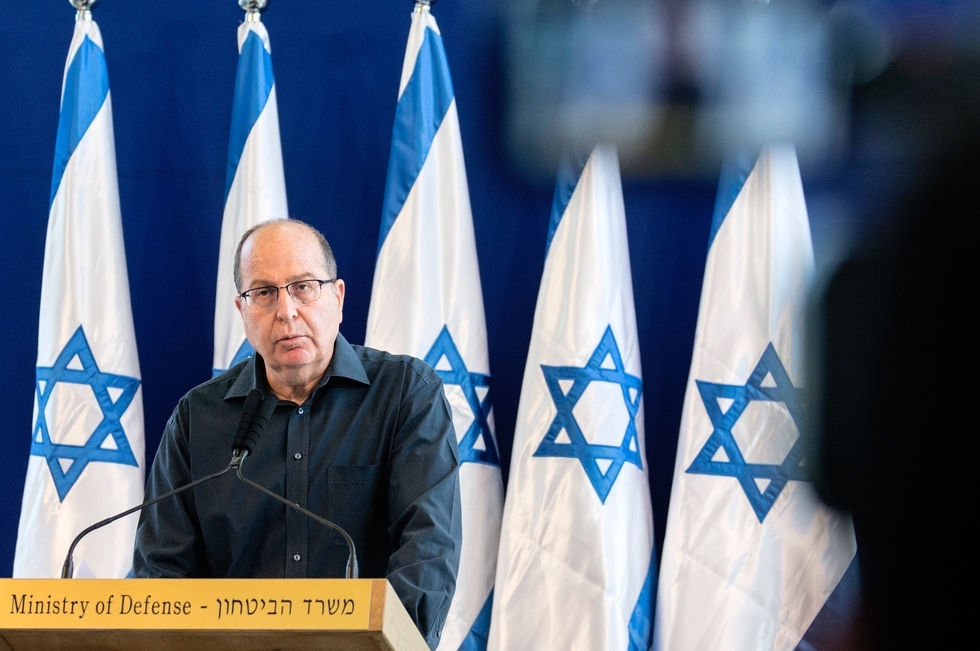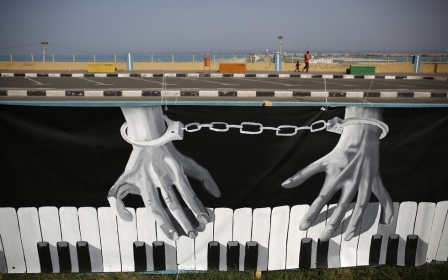The coup against Israel’s army

A military coup is a known political phenomenon in both ancient and recent history. The army storms the government's palace and takes control. Yet what happened on 20 May in Israel, with defense minister Moshe “Bogy” Ya'alon making way for Avigdor Lieberman, may be best described as a civilian coup by a right-wing political class against an army that stood in its way.
The process that led to the dramatic political events was a long one. Tomer Persico, an expert on religion and a keen observer of Israeli society, defined it as "people standing against the state," putting ethnocentric (Jewish) values above all others.
Ethnic belonging and not citizenship has become the essence of being an Israeli. The old elites in the public sector or in the press or cultural circles, seen as custodians of the outdated republican-like ideas such as the rule of law or human rights, have been under constant attack.
For many years, the army, the most prestigious and unifying organ in Jewish-Israeli society, was relatively immune from this kind of criticism. Yet this has changed. During the last war on Gaza in the summer of 2014, Naftali Bennet, head of the Jewish Home party and one of the bearers of this new revolution, became an open opponent of the military high command and its political representative in government, then-defense minister Ya'alon.
Based on information - probably from middle-ranking commanders, many educated in national-religious institutions - Bennet vehemently criticised the army's behavior in Operation Defensive Edge, accusing it of withholding crucial information from the government and hesitating in tackling Hamas. The fact that the army openly warned the government against occupying Gaza was seen almost as an act of cowardice.
But Bennet's criticism, shared partly by then-foreign minister Lieberman, was met by a tight coalition between Prime Minister Benjamin Netanyahu on the one hand and Ya'alon and the high military command on the other. Both preferred a limited military operation and an Egyptian-brokered ceasefire over the more ambitious goal of toppling Hamas and disarming its attacking capabilities.
Big military operations
Yet they had different reasons for their positions. Netanyahu is not enthusiastic about big military operations because they endanger the status quo, which allows Israel to maintain its control over the West Bank and continue its settlement project. The army is reluctant for large-scale offensives because it has come to the conclusion that it cannot secure a clear victory in the current circumstances of the Israeli-Palestinian conflict, a lesson learned from successive operations in Gaza and elsewhere.
At the same time, the high military command estimates that the chances of a political solution to the conflict are slim to non-existent. The preferred option, therefore, is to keep the conflict at a low intensity.
In a way, Bennet was right in his criticism. Despite its overwhelming advantage over the Palestinians and its annual budget of more than $15bn, the Israeli army still searches for shortcuts in every military confrontation in which it participates.
Eventually, Netanyahu, Ya'alon and the army had their way in the summer of 2014 and a ceasefire was reached without toppling Hamas or occupying Gaza. But the Israeli elections last March that saw the formation of an exclusively right-wing government, without the participation the centrist Yesh Atid party of Yair Lapid, changed the balance of power.
The new generation within the right-wing parties was determined not only to govern, as they have almost uninterrupted since 1977, but also to change the nature of the state's institutions according to their political perceptions. They wanted to complete the process to which Persico referred: put the Jewish ethnos above the state and push aside values such as the rule of law, good government, human rights and even army regulations.
Bennet himself was nominated as the coalition’s education minister and began a process of rewriting school textbooks, especially those focused on history and political science. His party mate Ayelet Shaked was nominated as justice minister and set out on a battle to reduce the powers of the High Court and the judiciary system as a whole. Together with other ministers from the ever-rightist ruling Likud party, they initiated a set of laws aimed at restricting the activities of human rights organisations.
Heightened tensions
The outbreak of the violent events in the West Bank and Jerusalem at the end of last year heightened tensions already inflamed between the new emergent right-wing elite and the army. The army, loyal to its philosophy of low-level conflict, tried to contain the events. Instead of retaliating against the Palestinian civilian population, Ya'alon and the army pushed to relieve the pressure by giving more permits for work in Israel, for example.
This policy proved efficient as it probably helped prevent clashes from spreading to larger sections of the Palestinian society, but it remained highly unpopular among right-wing circles, who expected the army to "shoot to kill" whenever a Palestinian dared to attack or confront Israeli soldiers or civilians in the West Bank and elsewhere.
The turning point occurred in Hebron, where an Israeli soldier, El'or Azaria, shot and killed Abdel Fattah al-Sharif, a wounded Palestinian laying in the street who had allegedly tried to stab a soldier in the occupied city. The incident was filmed, the video clip circulated, and Azaria was quickly arrested and charged initially with murder.
Soon enough, the army and Ya'alon were grilled for prosecuting Azaria. The soldier became a sort of popular hero, who “did the right thing” - killing a Palestinian who dared to challenge Israel's control in the West Bank. Bennet confronted Ya'alon in government, and Lieberman, then a backbench MP after refusing to join Netanyahu's new coalition, even participated in a demonstration outside the military court where Azaria's hearings were held.
Yet despite this pressure, Ya'alon and the army did not back off and insisted on bringing Azaria to trial. It was not only a moral question. The army, so it seems, also feared that if it let Azaria off the hook it would encourage other soldiers to follow his example, endangering its low-intensity strategy towards Palestinians. But the right wing saw it as just another sign of the army's weakness towards the Palestinians.
A speech by General Yair Golan, deputy chief of staff, on the eve of Remembrance Day for the Holocaust proved to be the tip of the iceberg. Golan warned that the “horrific processes” that developed in Europe and Germany before the Second World War “find remnants … among us” today.
Any comparison between the current situation in Israel and Nazi Germany usually raises a huge uproar in Israel, but this time it was worse. It came from the mouth of one of Israel's top generals. For the right wing, and even for Netanyahu, this was the proof they needed that the army, instead of “fighting the enemy,” had become too political, wading into the business of giving moral lessons to Israeli society.
The events that led to Lieberman's nomination were partly accidental. Netanyahu wanted to enlarge his government. The negotiations with the Zionist Camp led by Isaac Herzog failed, and Lieberman was an easy option. But they also have a more profound meaning.
Israel's new elites
Lieberman, an emigrant from Moldavia who served only a few months in the army in the quartermaster's store that oversees the distribution of supplies and provisions, is an exemplar representative of Israel's new elites. Ya'alon, a vouched secular raised in a Labor youth movement who spent many years in a kibbutz, is a typical representative of the old guard. Yehuda Glick, who will replace Ya'alon in parliament, is the leader of the “Temple Mount Loyalists,” one of the prominent movements of the new, unapologetic, religious right wing. Another member of the new elites.
Yet the significance of this turn of events is not merely symbolic. By replacing Ya'alon with Lieberman, the new right wing is taking a big step towards overrunning the largest and maybe the final bastion of Israel's state organs – the army. The fact that many of its low- and middle-ranking officers are already sympathisers of this new ethnocentric thinking will certainly facilitate this process.
A crucial question remains: what will the new right-wing elite do with this freshly gained trophy? Will it use it to annex areas in the West Bank, as Bennet has preached for many years, or to occupy the Gaza Strip and wipe out Hamas' rule, as Lieberman has suggested more than once? Or will these right-wing enthusiasts discover that there is no real military solution for the Israeli-Palestinian conflict?
For the moment, it seems that Netanyahu has no intention of going the way indicated by Bennet, Lieberman and their like. He still prefers the status quo. But coups have a tendency of toppling the ones who initiated them. Netanyahu may well become the victim of his own revolution.
- Meron Rapoport is an Israeli journalist and writer, winner of the Napoli International Prize for Journalism for a inquiry about the stealing of olive trees from their Palestinian owners. He is ex-head of the News Department in Haaertz, and now an independent journalist.
- Meron Rapoport is an Israeli journalist and writer, winner of the Napoli International Prize for Journalism for a inquiry about the stealing of olive trees from their Palestinian owners. He is ex-head of the News Department in Haaertz, and now an independent journalist.
The views expressed in this article belong to the author and do not necessarily reflect the editorial policy of Middle East Eye.
Photo: Israeli co-leader of the Zionist Union party, Labour Party's leader and head of the opposition, Isaac Herzog, addresses the audience during the Ynet and Yedioth Ahronoth's anti-BDS conference in Jerusalem on 28 March, 2016 (AFP).
- See more at: http://www.middleeasteye.net/columns/when-israels-main-opposition-party-has-problem-countrys-palestinian-citizens-1878921672#sthash.O7eVJfX3.dpuf- Meron Rapoport is an Israeli journalist and writer, winner of the Napoli International Prize for Journalism for a inquiry about the stealing of olive trees from their Palestinian owners. He is ex-head of the News Department in Haaertz, and now an independent journalist.The views expressed in this article belong to the author and do not necessarily reflect the editorial policy of Middle East Eye.
Photo: Israel's Moshe Ya'alon announces his resignation as defence minister during a news conference in Tel Aviv on 20 May, after Israeli Prime Minister Benjamin Netanyahu offered the post to Israel's hardline former foreign minister to expand his governing coalition. (AFP)
New MEE newsletter: Jerusalem Dispatch
Sign up to get the latest insights and analysis on Israel-Palestine, alongside Turkey Unpacked and other MEE newsletters
Middle East Eye delivers independent and unrivalled coverage and analysis of the Middle East, North Africa and beyond. To learn more about republishing this content and the associated fees, please fill out this form. More about MEE can be found here.





